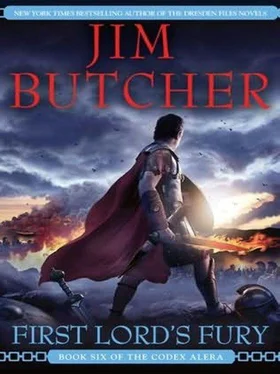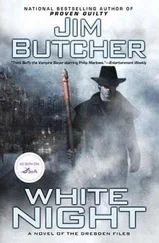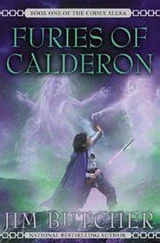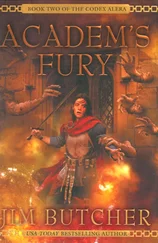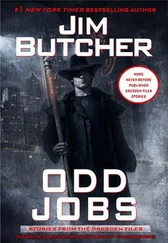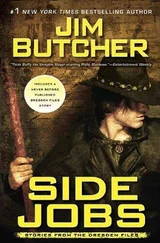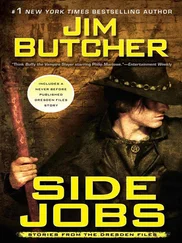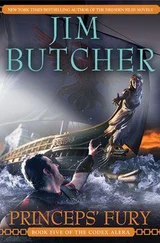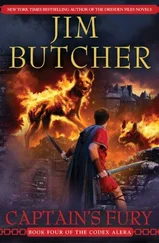Marcus saluted. “Of course, sir.”
“Thank you,” the captain said. “Demos is on the aft deck, I believe.”
Marcus checked his weapon and armor as he marched down the length of the ship to Demos, an old soldier’s habit long since become something very near a reflex action. As he walked, he watched the ships of the fleet gliding gracefully around the Slive and proceeding to the east. He went up several short, steep stairs to ascend from the deck to the raised afterdeck, and noticed his legs shaking with fatigue. The tunneling had taken a great deal more out of him, physically, than he had anticipated. The realization seemed to spark a general revolt of his limbs, with muscles and joints each voicing distinct and unique complaints.
Marcus gritted his teeth and exchanged nods with Demos and the bosun.
“First Spear,” Demos drawled. As usual, the sword-slender captain of the Slive was dressed in plain, well-made clothing, all of it in black. He wore a long dueling blade at his side, its handle plain and worn. “You all right?”
Marcus grunted. “Starting to think that maybe I’m getting too old for all this running around.”
“Maybe you should retire,” Demos said.
“Soon as the work is done.”
“Work’s never done,” Demos said.
“Hngh. Maybe I’ll get lucky and catch an arrow in the eye.”
Demos’s bland face barely showed a shadow of a smile. “That’s the spirit.” He turned his eyes to the sky and pursed his lips. “Octavian was right.”
Marcus squinted up to see that the scattered line of vordknights were gathering into a more cohesive swarm. “How many?”
“Ninety, maybe a hundred,” Demos said.
Marcus drummed his fingers on the hilt of his sword. “And how many on your crew?”
“Twenty-seven,” he replied calmly. “And me. And you. And the Princeps. And Antillar. Plus young Antillus and his flyboys overhead. Enough.”
“Assuming the enemy isn’t bringing something new to the fight.”
Demos showed his teeth. “Don’t go all giddy on me.”
“If the world were a giddy place, it wouldn’t need men like me,” Marcus said.
Demos nodded. “Me, either.” He squinted speculatively. “Wonder if Octavian’s going to stretch his muscles.”
“As far as I know, his talents are still rather limited.”
Demos gave Marcus a deadpan look. “We’re sailing down a smooth, flat sheet of ice, which is staying cold in the middle of spring, running in front of a wind coming in from a good angle to move us that hasn’t wavered or fluttered for two days.” He looked back up at the oncoming vord. “That isn’t luck. There isn’t that much of it in the whole world.”
Marcus had long suspected that the captain’s talents had begun to blossom, and Demos had a point. If he was unsure of his abilities, the captain might well decide to test them upon a real foe in some controlled fashion—somewhere out of sight of the rest of the fleet, in the event that things did not proceed well.
The last of the fleet’s ships went gliding past, and Demos watched its stern speculatively. “There they go.”
“Might want to get your men out of the rigging,” Marcus said. “Vord’ll be here shortly. The flyboys will be making it too breezy for them to come down on us all at once.”
Demos nodded laconically and gestured to the bosun. He started bellowing sailors down out of the rigging. Though they often went about armed with knives, today Demos’s crew were all wearing armored jacks and carrying blades and other instruments of martial mayhem. Demos ordered the sails furled, taken down, and stowed, so that they would not become victims of combat. He’d also ordered the decks wetted, and the crew had been slopping laboriously melted water over the entire ship for the past quarter of an hour. Despite the wind and cold air from the north, the temperature was not quite sufficient to refreeze the water on the deck, and the Slive ’s timbers soaked it up as if the ship herself was thirsty to return to the sea.
Marcus could hardly fault Demos’s caution. Firecrafting could be dangerously unpredictable in a battle, even when used by experts. If the captain had decided to try his hand at it, Demos’s precaution was entirely sensible. They had just finished when one of the sailors cried out, “Here they come!”
Marcus turned his head to see the group of vordknights alter course and go into a steep dive toward the motionless ship. As they came down, perhaps a score of them split off from the main body, diving ahead of the rest to engage Antillus Crassus and his Knights Aeris.
Tribune Crassus made a broad circling motion over his head with his left arm to gain his Knights’ attention, and flashed a quick series of hand signals. Half a dozen of the Aleran fliers streaked up to meet the contingent of vordknights, falling into a v-shaped formation as they went. The others, including Crassus, remained behind to guard the ship.
Marcus had time to see the enemy vanguard engage the Knights. The six men of the First Aleran simply bowled through their more numerous opponents, with the lead flier diverting his windstream, slewing it around in wide arcs that scattered the vordknights like dandelion fluff. The two men on either side of the leader closed in to catch his arms and prevent him from falling, while the other three struck at a number of vordknights whose efforts to regain control of their flight had brought them within striking distance of a weapon. One of the Alerans’ blades struck home, and a vordknight went spiraling off on an odd angle, leaking a spray of green-brown blood, a severed wing fluttering down more slowly above him.
Then the main body of the vord drove through the Aleran vanguard to fall upon the ship.
At another signal from Crassus, tempest winds suddenly howled, and vordknights began to veer off, forced away from the ship by the violence of the gale. The first thirty or forty of the enemy were driven off, but there were simply too many of them for the Knights Aeris to reach them all. A few managed to wing down through the winds, and as the attack went on, the vord forced away earliest began to circle and fall upon the ship from every direction. Weapons flashed in the light, and someone screamed.
A vordknight landed on the deck not six feet from Marcus, and sent a lightning flash of terrified energy through his body.
The enemy was a few inches shorter than he, and roughly man-shaped. Its body was covered in chitinous armor, layered in bands that almost seemed to resemble a legionare’s lorica. Its head was roughly the shape of a helmeted Aleran’s though there was no opening where the mouth should have been—only smooth skin. Its eyes were multifaceted and greenly reflective, like a dragonfly’s, an impression echoed by the four broad, translucent wings upon its back, now slowing from the blurring shape they had been in flight and folding in upon the vordknight’s back.
Those alien eyes turned to Marcus, and the vord rushed him. Both of its arms ended in scything blades rather than hands, and its weapon-limbs were upraised and ready to strike.
Marcus sidestepped the first double blow of the deadly appendages, drawing his blade as he did. His first stroke clove into the chitin on the vord’s shoulder, and was nearly trapped there as the vord’s momentum carried him past. Marcus managed to jerk the weapon clear in time, leaving an ugly wound hacked into the vord’s flesh. The weapon came away stained with green-brown blood.
The vord spun to return to the attack—but there was a flash of steel and angry scarlet sparks, and the vordknight’s head jumped up off its shoulders as if propelled by the blood that jetted up in a fountain behind it.
The headless vordknight turned in place as if the blow had done nothing to inconvenience it, blades slashing. Captain Demos, long blade in hand, was forced to leap back from the foe, though his sword spat angry scarlet sparks again as it met one of the enemy scythes, and cut it cleanly from the vord’s body. Demos regained his balance, hacked the vord’s other scythe away with casual efficiency, then stepped forward and drove his heel into the thrashing creature’s belly. The kick sent it tumbling over the side of the ship.
Читать дальше
